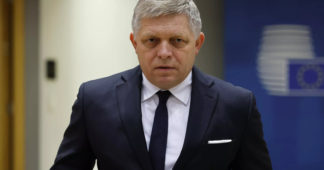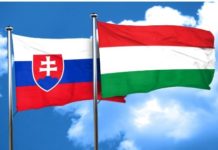May 25, 2024
Georgian leader Irakli Kobakhidze has refused to provide military aid to Ukraine and opposes the influence of Western-backed NGOs in the Eastern European country.
Just over a week after an attempt on the life of Slovak Prime Minister Robert Fico, a top European Union official has warned another Ukraine-skeptic leader that he could suffer a similar fate.
That’s the claim made by Georgian Prime Minister Irakli Kobakhidze, who made the startling revelation Thursday in a post on social media.
“You see what happened to Fico, and you should be very careful,” European Commissioner for Neighborhood and Enlargement Oliver Varhelyi allegedly told Kobakhidze during a telephone call in which the Georgian leader was threatened with “a number of measures” in response to the passage of a proposed foreign NGO transparency act.
Varhelyi acknowledged the comment in a statement released soon after, but claimed it was not intended as a threat.
“I would like to express my very sincere regret that a certain part of my phone conversation was taken out of context,” said the EU bureaucrat, who claimed the remark was “presented to the public in a way which could give rise to a complete misinterpretation.” Varhelyi took the opportunity to once again urge Kobakhidze not to adopt the legislation, which is similar to the United States’ Foreign Agents Registration Act and laws in various other countries.
“It sounds so Mafia-esque,” said Garland Nixon on Sputnik’s The Critical Hour program Friday.
Analyst Steve Poikonen agreed, noting a string of independent world leaders who have been harmed or killed in recent years.
“You had the helicopter crash of Iranian President Raisi, you had multiple coups and overthrow attempts in Haiti,” said the political organizer. “Let’s add all of the four or five different African leaders who died of mysterious and suspicious circumstances over the last 4 or 5 years.”
“It seems odd, and I may be painted as a conspiracy theorist for this but all you really have to do is act in a way that is unfavorable to NATO and you wind up either being targeted or assassinated,” he claimed. “Now, only history will prove me right on this… but it really does sort of form a pattern.”
The late Venezuelan President Hugo Chávez observed a similar pattern in 2011 after a number of anti-imperialist Latin American leaders, including Argentine President Cristina Fernández de Kirchner, Paraguayan President Fernando Lugo, and former Brazilian Presidents Dilma Rousseff and Luiz Inácio Lula da Silva were diagnosed with cancer.
“I am not accusing anyone,” said Chávez, who himself had recently been diagnosed with pelvic cancer. “I am simply taking advantage of my freedom to reflect and air my opinions faced with some very strange and hard to explain goings-on.” The charismatic Venezuelan leader would succumb to his illness 14 months later.
“The bill that [Kobakhidze is] trying to push through the Georgian Parliament is for the color revolution industry to have to declare itself that it’s coming into his country to start doing color revolution stuff,” said Poikonen, referring to legislation that has sparked large protests in the country’s capital of Tbilisi.
“For everybody that’s been happy to basically have watered down versions of the exact same laws that the United States itself has should on its face show you that they’re trying to get whatever are the whims of NATO, or the US and UK and Israel, and that’s what the agenda is. And he should increase his security detail and he should definitely make sure that there’s a couple of brand new dogs around the property.”
Western-backed non-governmental organizations are an important way for the United States and other foreign powers to exercise influence in adversary countries, allowing outside actors to foment unrest and even regime change. The tactic forms an important part of US efforts to install compliant regimes through non-military means in events that are known as “color revolutions.”
We remind our readers that publication of articles on our site does not mean that we agree with what is written. Our policy is to publish anything which we consider of interest, so as to assist our readers in forming their opinions. Sometimes we even publish articles with which we totally disagree, since we believe it is important for our readers to be informed on as wide a spectrum of views as possible.











